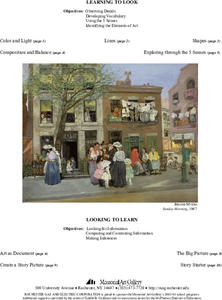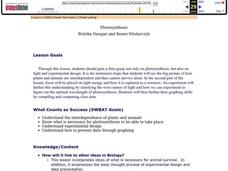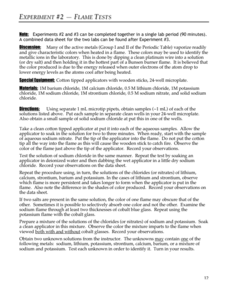Teach Engineering
Thirsty for Gold
In the last portion of the six-part unit, teams perform an experiment with gold nanoparticles to determine which sport drink has the most electrolytes. The nanoparticles are used as chemical sensors and fluoresce in different wavelengths...
Curated OER
Color
Young scholars study the elements of color in paint and light. For this color science lesson, students discuss colors in their world, white light, and rainbows. Young scholars mix three primary paint colors to make various secondary...
Curated OER
Light Is Amazing
Students investigate light and its energy. They discuss the properties of light, research how much light the moon absorbed on their birthday on a website, complete a graphic organizer, and create a kaleidoscope.
Curated OER
I'll Build You A Rainbow
Sixth graders conduct a variety of experiments to explore types of light and the concept of refraction. They observe objects in water, use water and prisms to create rainbows and combine light filtered through colored cellophane to...
Curated OER
Looking into Surface Albedo
Students demonstrate how the color of materials on Earth affect the amount of solar energy that is absorbed. In this solar energy lesson students complete a lab to explore how the color of materials on the Earth's surface impacts warming.
Curated OER
Remote Sensing and the Electromagnetitc Spectrum
Fifth graders conclude that each color of the spectrum has a different amount of thermal energy by measuring temperature with a thermometer. They infer that there is an invisible band of the spectrum by measuring temperature beyond the...
Curated OER
Let the Sunshine in
Students collect and analyze data to study wavelengths of visible light. They cover Styrofoam cups with three different colors of sun filtering products and shine a lamp directly on the cups. They determine the most effective filtering...
Curated OER
Why is the Sky Blue?
Students explore diffusion or scattering of light. In this physics instructional activity, students explain why the sky is blue and sunsets/sunrises are red.
Curated OER
Physical Principles in Living Systems
Seventh graders experiment with white light, plane mirrors, and curved mirrors in order to demonstrate the physical principles of living systems. In this physical principles lesson plan, 7th graders take 3 days to discover what happens...
Curated OER
Experiments with Photovoltaic Cells
Pupils explain how sunlight is converted to electricity. In this series of physics lesson, students study how varying the characteristics of the light source affect photovoltaic cells. They research their different uses in other countries.
Curated OER
How is heat transferred through conduction?
Fifth graders observe different types of conductors. They answer orally about the conduction of heat energy with 100% accuracy. Students investigate some materials that conduct heat much better than others, and poor conductors can...
Curated OER
(S-4) The Many Colors of Sunlight
Students observe and explore the characteristics of light.
Curated OER
The Effects of Solar Energy
Students examine how solar energy is absorbed and used. In this solar energy lesson students complete several activities that allow them to better understand solar energy.
University of Texas
Lives of Stars
Stars exist from a few million years to over 10 billion years, depending on their mass. Scholars perform a play acting as stars to learn about their different life cycles. They develop an understanding of many of the fundamental concepts...
Memorial Art Gallery
Learning to Look, Looking to Learn - Peeling Onions
Lilly Martin Spencer's "Peeling Onions" is the subject of a series of exercises that model for learners how to use the elements of art to read a painting. A series of worksheets focus viewers' attention on how Spencer uses color and...
Memorial Art Gallery
Learning to Look, Looking to Learn - Sunday Morning
Jerome Myers' depiction of the urban landscape in "Sunday Morning" is the focus of a series of activities that asks viewers to examine how an artist uses the elements of a painting to tell a story. The resource packet includes an image...
Curated OER
Introduction to Photovoltaic Systems
The Green Education Foundation found that this lesson plan, written by the Texas State Energy Conservation Office, is right up their alley when it comes to teaching sustainability. It is ideal as a first lesson plan on photovoltaic...
Curated OER
Color
In this color worksheet, students read about light, prisms, the RGB model and the CMYK model. Students match colors with their definition, they draw the color chart, they apply the RGB and CMYK models to make colors and they interpret...
Curated OER
Photosynthesis
Students recognize the importance of plants as they perform an experiment involving photosynthesis. Students determine the optimum wavelength of light for photosynthesis by exposing plants to different colors of light, collecting data,...
Ocean and Coastal Interdisciplinary Science
The Dark Ocean
Is the ocean blue at all depths? Nope! Explore the science behind the light spectrum in deep, dark waters. The lesson recommends watching The Blue Planet: Open Ocean—The Deep, but it's not integral, or you can substitute another clip....
Curated OER
Sleuth Rays
Young scholars conduct a close examination of the atom's electrons, and discover how to theorize the energy levels, observe the brightness of light, classify colors, and measure temperature.
Curated OER
Aurora Borealis
Students discuss what causes the northern lights and the folklore attached to them. They discuss magnetic fields, and use various common materials to discover if ions conduct electricity.
Curated OER
What's the Frequency, Roy G. Biv?
Introduce starting space scientists to the electromagnetic spectrum, expecially the portion of visible light. Teach them about wavelength and frequesncy. Then give them a roll of adding machine tape and a manila folder to make a...
Pingry School
Flame Tests
Light a fire in your pupils! Scholars conduct a flame test and observe the emission spectra of several different salts in an enlightening hands-on investigation. They use their observations to make comparisons and conclusions about the...

























